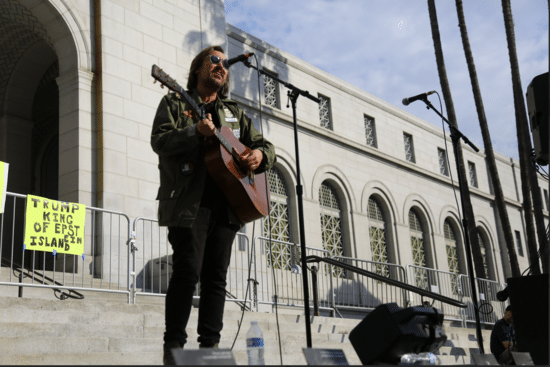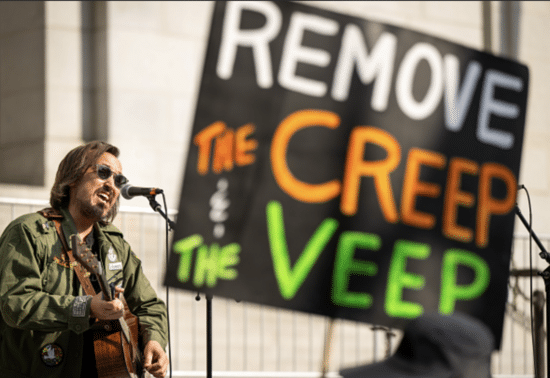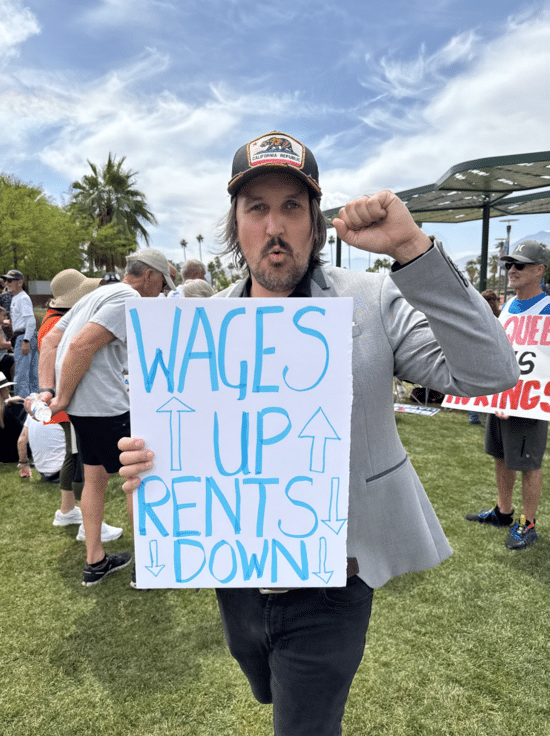OneRepublic star Tim Myers wants to trade guitars for governance
Is California ready for its first alt-rock politician?
Tim Myers, a founding member of OneRepublic and music-label owner, sure hopes so. The 40-year-old jumped into the race for lieutenant governor earlier this summer, saying that California needs leaders who are willing to stand up to President Donald Trump’s attacks.
“I was sick and tired of sitting on the sidelines and seeing good people getting hurt. I’ve heard story after story of young people not being able to afford homes in California because the cost of living here is so crippling. Then there’s Trump coming here with the National Guard, trying to enforce his immigration policies,” Myers told Daily Kos. “Now is the time to step up.”

Myers was initially running for Congress—hoping to unseat GOP Rep. Ken Calvert—but dropped out of the crowded primary to pursue a statewide run. He said the lieutenant governor’s post is a better perch to oppose Trump’s agenda.
“Congress is a circus right now. As lieutenant governor, I could effectively stand up to Trump and use it as a bully pulpit to drive significant change in the state,” he said. “My candidacy seems to be connecting and resonating with folks, so I’m happy with my decision.”
The job itself isn’t particularly powerful, but it has served as a launchpad for several governors. Myers is entering a crowded field that includes California Treasurer Fiona Ma, former Stockton Mayor Michael Tubbs, Sausalito Council member Janelle Kellman, Chief Service Officer Josh Fryday, State Board of Equalization member Mike Schaefer, and former state Sen. Steven Bradford.
Incumbent Lt. Gov. Eleni Kounalakis had thrown her hat in the ring for governor since Gavin Newsom is term-limited and can’t seek reelection in 2026. But she ultimately ended her campaign and decided to run for state treasurer instead.
Myers, who now lives in Los Angeles, grew up in Corona, where his dad was a pastor, and had stints as both a janitor and barista before his music career took off—experience that he says shaped his views on work and opportunity in today’s California.
Daily Kos, which is not endorsing anyone in this race, had the opportunity to interview Myers about his campaign.
This interview has been lightly edited for length and clarity.
Daily Kos: You’re a political outsider. So why run for office?
Tim Myers: The way politics are is between the haves and the have-nots—the establishment and corrupt politicians and the billionaire class versus the people and the working class.
I recognize the urgency to step up and help my state. This is the most heated period in my lifetime in politics, and we need leaders who are outside of the system. The system is completely dysfunctional, and it needs to be fixed. We need outsiders—a whole bunch of them—to rise against the establishment and restore the system.
DK: And why now?
Myers: A lot has been building up to this. I wanted to dedicate significant time to getting involved and diving into politics. Then, as things started escalating and with everything Trump has done targeting California—bringing in the National Guard and invading our state—I looked around and saw our leaders not standing up, protesting, or being active.

A few weeks ago, I attended a protest at a Kern County prison that the Trump administration turned into an ICE detention center. While there, I spoke to an organizer of the rally who said they had invited [Los Angeles Mayor Karen] Bass and Newsom, among others. Still, they hadn’t come out to visit the facility. There’s a lack of urgency to fight back in our state, and while I’m glad to see Newsom stand up to Trump more recently, we need a lot more of that.
DK: It’s a crowded field of Democratic contenders. What makes your candidacy stand out?
Myers: The other candidates are career politicians, and they’ve all made it clear that they’re using this seat as a stepping stone to become governor and climb the ladder. I also felt that none of the other candidates were attending protests to send a clear message about the direction they wanted the party to take, which was disheartening.
Then, as I researched the candidates further, I discovered that some of them were embroiled in scandal. That’s mind-blowing to me. I’m a true-blue Democrat, but we need to weed those people out. If we elect the same old politicians, nothing will change.
DK: Are you leaning on your music career to help you in this campaign? You know, people love a celebrity endorsement.
Myers: We’re hosting a private fundraiser concert in Los Angeles soon, featuring a lineup of musical artists, and plan to offer various celebrity items as part of select ticket tiers available to attendees.
When it comes to securing celebrity endorsements, I’ve had celebrities text me saying they’d love to endorse or support. However, the endorsements I value most come from everyday people. I’m not sure I necessarily want a Kardashian’s endorsement.
DK: If you were to identify California’s three most significant issues that you think you can help fix, what would they be?

Myers: Crime is a serious issue. Last year, during the holidays, my wife and kids were at the mall when a man in a ski mask approached them and chased them back to their car—it was terrifying, and a serious problem.
Homelessness ranks second. Downtown Los Angeles and San Francisco are flooded with homeless people, which is upsetting because we’re so wealthy. The state and the country are incredibly rich, and I genuinely believe there shouldn’t be anyone without a home among us. Growing up as a pastor’s kid, I was taught to care for those who are the most vulnerable and the least fortunate. It amazes me that we haven’t fully addressed this.
Third is housing affordability. In California, it’s nearly impossible for many to buy a home. I want to cut through the red tape and ensure that young people can afford homes here in California, with ample incentives to support them.
DK: You mentioned that your father was a pastor, and I’ve read that you grew up in a conservative Christian household. Has that influenced any of your politics or policy positions?
Myers: My dad’s a Republican; my mom’s a Republican; my sister is a Democrat and a lesbian, and she’s my best friend and my favorite person in the world. Our household was exciting growing up because my parents genuinely encouraged us to have our own beliefs and discover our own truths. They repeatedly told us to question everything and form our own conclusions—something that feels quite the opposite of what someone might expect from a pastor. But those teachings really stuck with me.
In 2006, [former Vice President] Al Gore’s climate movie, “An Inconvenient Truth,” was released, and I remember that film had a profound impact on my sister and me. I don’t think I was old enough to vote yet, but seeing that movie made me want to vote for the Democratic Party.
Most kids adopt their own family’s beliefs, and I’m so proud that my parents encouraged me to think for myself and develop my own opinions and truths. Because of their teachings, I have become incredibly open-minded.
DK: Newsom is now leading the effort to offset Republicans’ power grab in Texas and is doing a pretty good job trolling Trump. But do you think he’s done enough for the Democratic Party to boost its message?

Myers: I voted for Newsom both times, but there are things he has done during his governorship that have been frustrating to watch. For example, I was disappointed when he visited [the restaurant] French Laundry during the height of the COVID-19 pandemic—that was frustrating.
I appreciate that he’s making an effort now. He’s standing up to Trump, which I admire, even though some of his more recent social media posts seem a bit lame in my opinion.
That said, I’d be lying if I didn’t admit that a part of me is somewhat concerned about his intentions: Is he worried about running for president in 2028, or is he genuinely focused on our state and our well-being? Sometimes it’s hard to tell.
DK: Do you support California Democrats temporarily suspending the state’s independent redistricting commission via a ballot measure and handing control back to the legislature and potentially changing California’s districting lines?
Myers: I hate it all. On both sides, it feels undemocratic. We should wait until after the census to change district lines, and it’s disgusting that Trump is trying to cheat. I praise Newsom for standing up—that’s the right thing to do—but at the same time, it sickens me that this is even happening.
DK: This particular seat is widely seen as a springboard to higher office. Can this lead to something bigger politically—or are you hoping it will for you?
Myers: I’m really proud that I am the only candidate running for lieutenant governor who hasn’t said that I want to someday run for governor when asked that question. My ladder and personal political ambitions don’t matter. What does matter is the working people who power this campaign—that’s whose trajectory I’m most concerned about.
